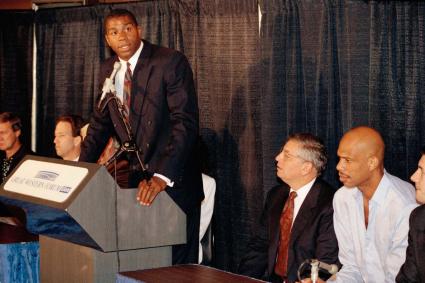A LESSON IN THE “V” WORD FROM MAGIC JOHNSON AND NETFLIX’S REED HASTINGS
ballislife.com
Truth is (despite my pure Celtics upbringing) I’m a Magic Johnson fan. There’s a reason ESPN once named him the greatest NBA point guard of all time. Passion, talent, and drive made him a thrill to watch as he propelled his team to five NBA championships.
Although his leadership skills on the court were unquestionable, and his post basketball contributions to both the war on AIDS, and to inner city economic development extraordinary, the “v” word I’m thinking about isn’t vision although no one could argue Johnson doesn’t have it. The “v” word I’m referring to is vulnerability.
Vulnerability isn’t something most fans would have easily associated with the 6’9” athlete when, more than 25 years ago and at the age of 32, he tearfully announced he was retiring from basketball because of HIV. His “then” story was life as an international basketball giant. His curb moment was HIV.
I knew I was going to suffer
When Johnson stood at the curb, he could have chosen a different path. “He didn’t have to announce it. He didn’t have to tell anybody, ever! He could have retired under the guise of a neck injury that put him in danger of paralysis. He could have said he was retiring because of family issues,” wrote LA Times writer, Bill Plaschke. “Only his doctors knew of his HIV and they were silenced by patient confidentiality.” At the time, most of his advisors counseled him to stay quiet about his health, but Johnson went public despite the expected backlash. “I knew I was going to suffer,” he says. Endorsements got pulled, friends disappeared, and a comeback was thwarted when several pro players, including Karl Malone and Mark Price, publicly denounced him for fear they would catch HIV. “It really hurt,” recalled Johnson.
Fox Sports / Getty Images
Google vulnerability and words like “extremely susceptible,” or “physically or psychologically weak,” come up. It’s a quality most of us run from, not aspire to. It’s the ability some people have to manage the balance between keeping the stiff upper lip or moving ahead no matter what, and contrasting it with letting their guard down, owning up to mistakes, and sharing blind spots. Sometimes vulnerability takes courage and often it comes with risk.
Today Netflix is an $8 billion dollar company producing a number of critically acclaimed series such as House of Cards, but a few years back, Reed Hastings, the CEO of Netflix, screwed up! Hastings made a decision to restructure and separate the DVD and streaming businesses and increase pricing. Customers were irate. The decision drove away an estimated 1 million of them and instantly drove the stock prices down by nearly half. Many speculated Hastings would resign amidst the pressure and controversy but he didn’t. Instead he apologized. In a company blog post he wrote, “I messed up, I owe everyone an explanation.
Nathan McAlone / businessinsider.com
In hindsight, I slid into arrogance based upon past success,” he wrote. “But now I see that given the huge changes we have been recently making, I should have personally given a full justification to our members on why we are separating DVD and streaming, and charging for both. It wouldn’t have changed the price increase, but it would have been the right thing to do.” Two years later, in a New York Times interview with James B. Stewart, Hastings said it wasn’t the media criticism or plunging stock price that got to him, it was the thousands of emails that poured in from angry and disappointed customers.
Fox Sports
“I realized, if our business is about making people happy, which it is, then I had made a mistake,” Hastings told Stewart, “The hardest part was my own sense of guilt. I love the company. I worked really hard to make it successful, and I screwed up. The public shame didn’t bother me. It was the private shame of having made a big mistake and hurt people’s real love for Netflix that felt awful.” He added, “I wasn’t naïve enough to think most customers care if the CEO apologizes, but I thought it was honest and appropriate.” His vulnerability resonated with both customers and analysts alike and, over time, he built up consumer confidence.
Although vulnerability seems like a bad thing, sometimes when you’ve been kicked to the curb, it’s the opposite. It strengthens you because you stop wasting energy protecting yourself from what you think other people shouldn’t see. Such proved the case for Johnson and Hastings. As Starbuck’s CEO Howard Schultz said “I don’t think you have to be vulnerable everyday but there are moments where you’ve got to share your soul and conscience with people and show them who you are, and not be afraid of it.”
Johnson’s story took a remarkable turn last month when Lakers’ owner Jennie Buss announced he would return as the Lakers’ new president of operations. Undoubtedly, Johnson’s announcement over 25 years ago was tough, and the transition to a new story challenging, but some would argue that he turned out to be a bigger player off the court than he ever was on it.
To learn more about Johnson see ESPN’s documentary The Announcement click here.




